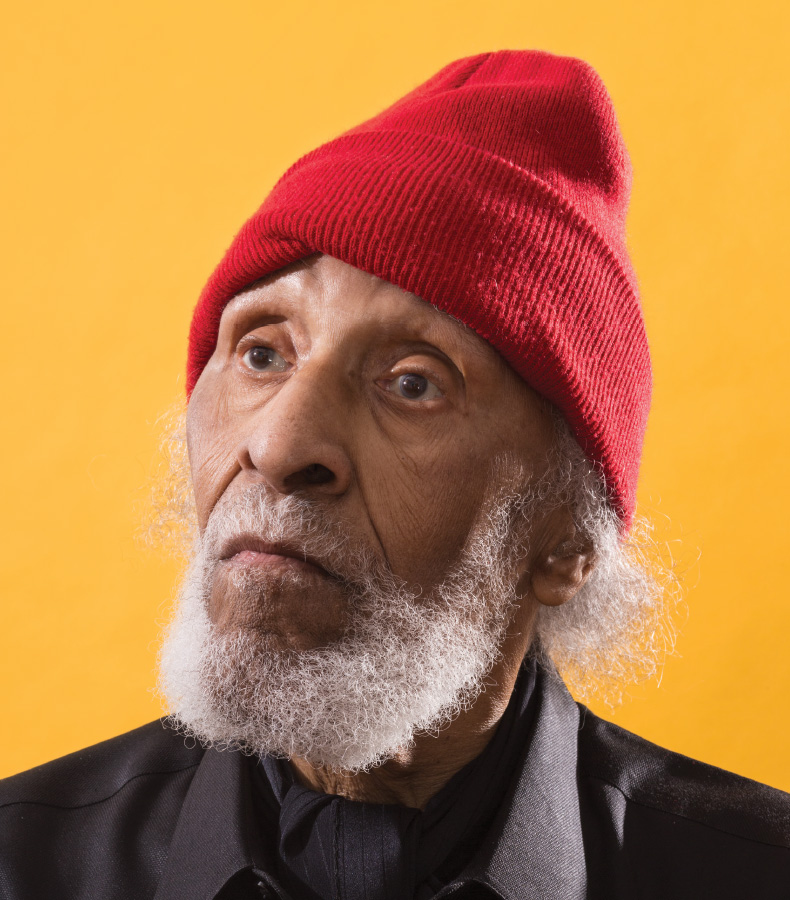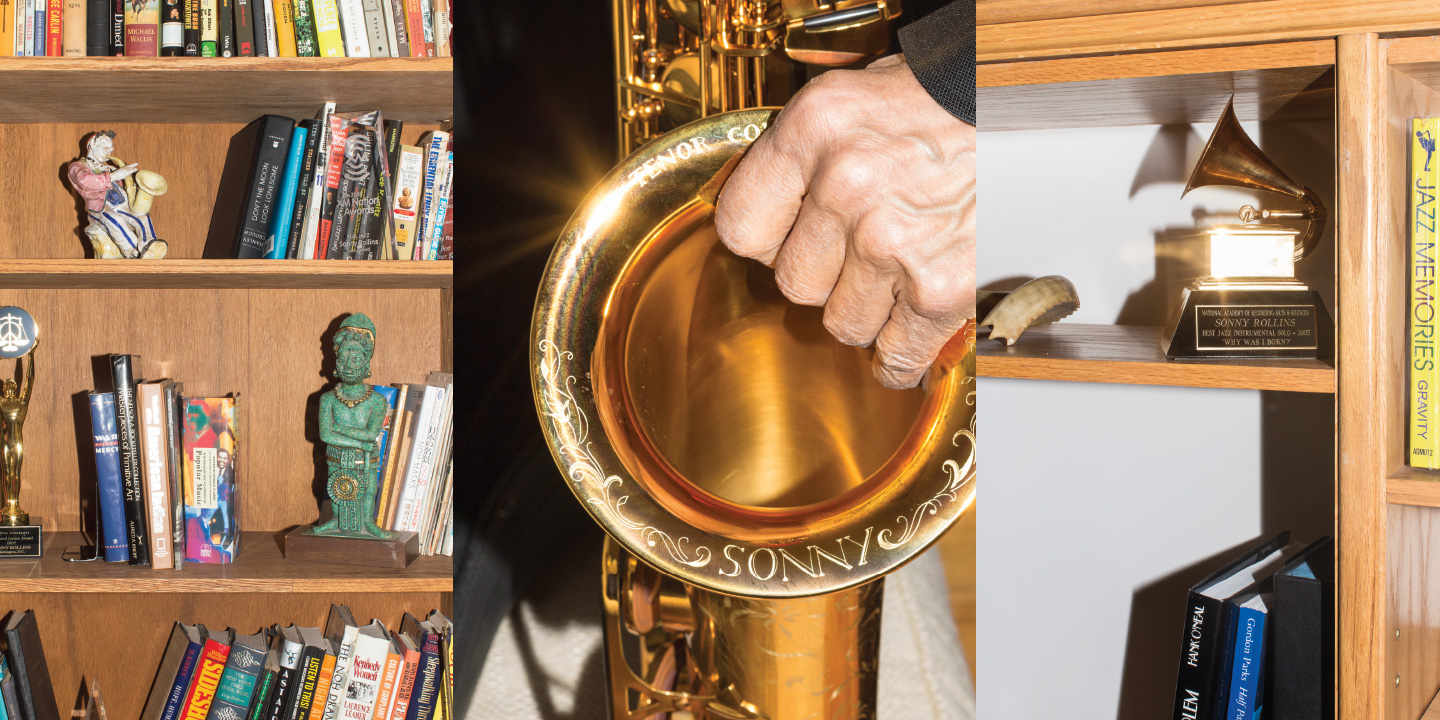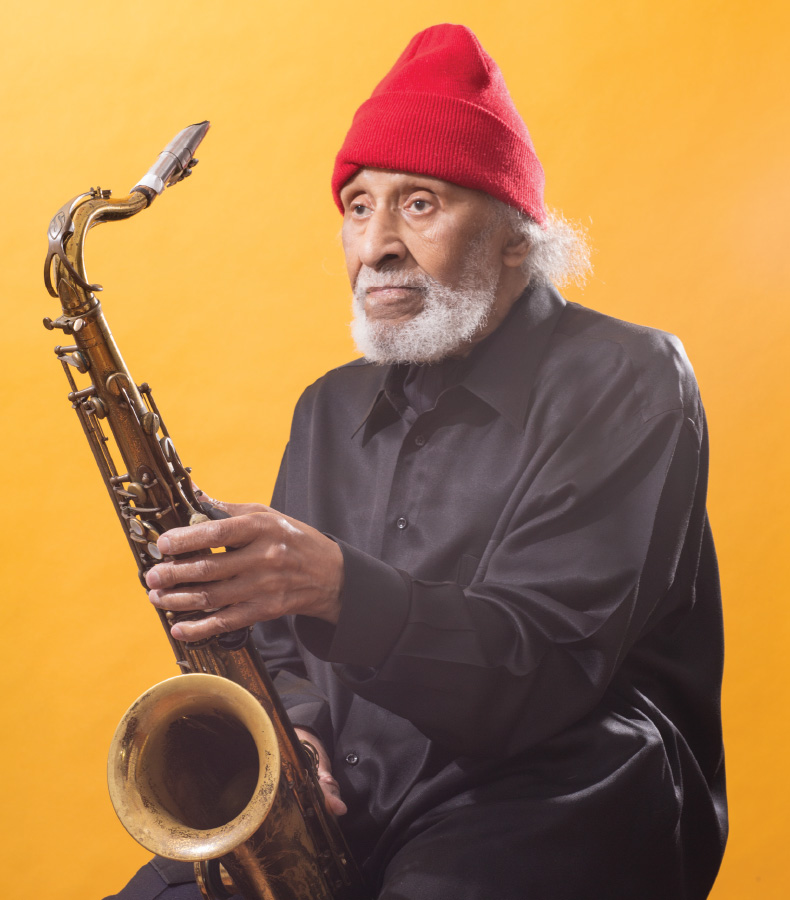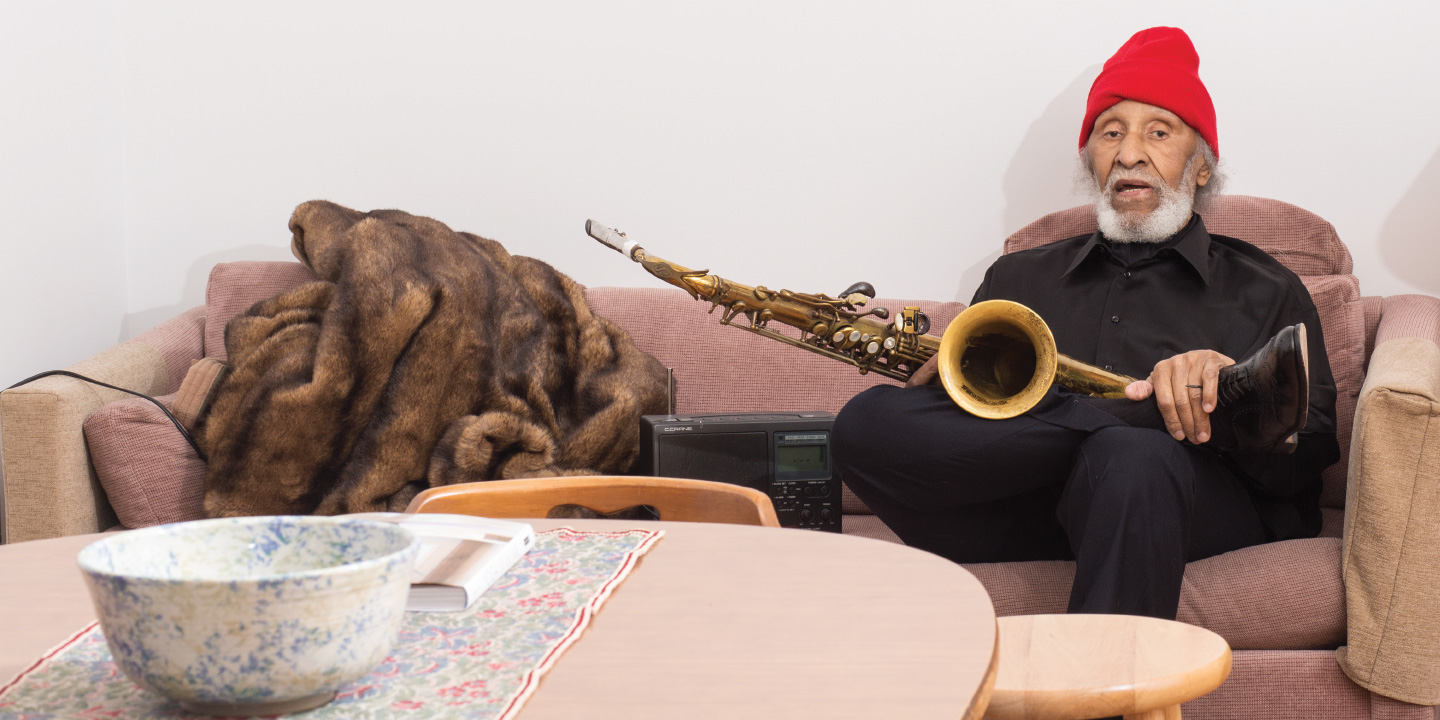Sonny Rollins: The Saxophone Colossus
The 85-year-old legend talks about his long history of civil rights activism and how jazz can be like a spiritual offering.
Meeting some people can feel like entering a fairytale, and interviewing the 85-year-old Sonny Rollins recently had that quality, beginning with the woods. Rollins has lived in upstate New York, for over 15 years now—the move was precipitated by 9/11—and trees heavy with early spring leaves line the front of his house, which is secluded.
Outside, one is aware of sound—bird calls, rainwater dripping off the roof—because that has been Rollins’ job for over 60 years now: to make others aware of what he hears, and what the world gives, sonically. Settling in his spacious sitting room, Rollins told me in his melodious, sonorous voice, why he hadn’t been able to tour behind his two most recent albums: just over two years ago, he was diagnosed with respiratory issues, a diagnosis which caused him to feel, he said, “really depressed.”
Sonny Rollins: I’ve come to terms with it. If I can play again, I’d like to play again. I feel I haven’t quite gotten where I wanted to get to in my music. I’ve had a successful career. I’ve done what I’ve always wanted to do, which is music. I’m 85 years old now, so there is nothing to be angry about. If I can play again, if I can get the medications, these new drugs, then fine, I’ll be able to play again. If not, that’s the way it is. I have accepted it.
You always keep developing, and even if you can’t play right now, you’ll be a different artist when you come back. That’s the wonderful thing about jazz, right? It teaches you acceptance in a certain way. When you play with this disease does it hurt your lungs?
It limits my breathing and then after I play for five minutes or so, I get fatigued. That’s the problem. But it’s not a thing where I’m in constant pain or anything.
You’ve always made a big distinction between recorded music and playing live. What are the differences for you between the two?
In front of an audience, I get more feedback and it’s easier for me to lose myself, because it’s about forgetting things and letting the subconscious take over. When I’m feeling the energy, I’m able to get into it and actually shut out the people more easily. That’s what improvisation is all about: losing conscious thought. You can’t think and play at the same time. I’ve tried it—can’t do it. You just have to put yourself in the state of mind where there’s no conscious thought. And then let the music come out.
I read that one of the first experiences of music that you loved was a concert that Frank Sinatra gave when you were in high school where he spoke about racial tolerance.
I’d like to address that. From the time I was a child my grandmother was an activist.
She was West Indian?
Oh yeah. My grandfather, her husband, was from Haiti, but my grandmother was from St. Thomas. Anyway, when I was a little boy I used to walk in parades up and down Lenox Ave. We would be marching for W.E.B. Dubois, Paul Robeson. I grew up with that. Through “Free the Scottsboro Boys.” Now fast forward to 1946, when they bussed us from where we lived on 175th Street. There was a new school opening up down in Italian Harlem, on 116th Street, off of the river. This was a new high school. We were met with a lot of hostility from the neighborhood. The people in the area figured it was some black kids coming into their neighborhood, and there were a lot of fights—people were throwing stuff out the windows as we were getting out. It was just a whole lot of violence. So Frank Sinatra came down to our school and did a concert. Naturally, he was an Italian hero. So he preached to the people that we shouldn’t fight with these kids, which was very helpful. Things straightened out after that. Now, I think that was great, but that was not my introduction to civil rights. I’ve been around it all my life. The wrong people have put on Wikipedia that Frank Sinatra came down, and it changed my life. That’s complete bullshit. And it’s very offensive.

It’s not giving credence to your family.
We even had a Black Nationalist flag in the house. I didn’t need Frank Sinatra to wake me up to civil rights. I love Frank Sinatra’s music. He’s a great singer. I think what he did then was very admirable, but it’s not about him. To me, it’s about trying to make me look smaller and him bigger. It’s making me look like I didn’t know what civil rights was all about, which is ridiculous. All my music had this—I did the Freedom Suite in 1958. Before that I had done this song “The House I Live In” that was a civil rights song by Paul Robeson. Why did I do it? Because I was trying to get black consciousness into people.
That’s one of the things I wanted to talk to you about. I remember LeRoi Jones’ book Black Music—before he was Amiri Baraka. He wrote very beautifully about your early work, and what he says is true about certain aspects of your music: romanticism, lushness, and also a moving forward—volition. How were you developing your style when you first decided to become a musician?
When I was a little kid, the first music I really heard was my favorite: Fats Waller. In Harlem, you’re right in the epicenter of jazz. I heard a lot because of the radio; those days, that’s where you heard everything. I heard Louie Jordan. And I heard calypso in my house with my mother. So I heard all this music growing up. That was my upbringing with music.
Jones is saying that there are different things that come into your music, but it’s your music. Having grown up with all sorts of black music, you were very nimble with the tunes that you would use to improvise, like “I’m an Old Cowhand” or “Toot Toot Tootsie.” These tunes that were very banal, but you were able to make them your own. Were you attracted to these tunes because they were banal, or was there a spark in them for you?
I think mainly the latter. There is always something in music that I like; I don’t know what it is. I heard in those songs something I felt that I could use. As I said, I heard a lot of this stuff when I was kid—my mother would take us to the movies. And I’d see all of these Hollywood movies with Hollywood music. What they call the American Songbook. Jerome Kern, all those composers.
Cole Porter.
Cole Porter. I guess I’m looking for something that excites me. If something struck me musically, I tried to use it. I didn’t feel that I had to be restricted.
I always felt that there was enormous optimism throughout your music. Toni Morrison has said that she wants to know something by the end of her story, something she didn’t expect. Do you think that’s what improvisation does?
I don’t know if I can respond to that exactly. Each thing is a story. Each song. Improvisation is a story in itself. I guess in some ways it’s similar: You can say that you’ve learned something about yourself.
And by extension, music. One great thing about your career is how much young people have learned from you. Did you feel, when you would have groups with younger musicians, that it was a way of teaching them the legacy—musically, politically, and so on?
Dizzy Gillespie really loved showing music to the younger musicians. That was part of who he was. I’m more like Miles in that if a guy can do the job, then he’s up there. You’re supposed to be able to get the gig by listening. I’m heartened if people feel they can get something from what I’m doing. But I never thought of myself as a real educator in that sense.
Speaking of Miles, I was interested in talking about your response to free jazz as something that wasn’t really your thing.
As far as so-called free jazz, well, I accept it. There’s nothing for me not to accept. I love all kinds of music. What LeRoi Jones is talking about, Our Man in Jazz, could be considered my more free jazz period. So yeah, of course: It’s good music. I just put whatever I could contribute into it. That’s really where I am and who I am.

To do your version of a thing.
I think that would be the way to describe me.
What about the times that you didn’t want to be part of the music business? There are a couple of big hiatuses. But you played every day still. And you’re playing on that bridge. Tell me what life was like for you then.
Well, I’ve taken several hiatuses in my life. Early on, of course, I had some drug problems. I got myself straight after paying some dues.
How long was that a problem for you?
I got in bad trouble. I was incarcerated around 1950. As a stickup man. The last thing I am is a stickup man. That’s the first time I had a gun, actually. I knew we needed money and that was the way to get it. But that wasn’t my thing—I was part of a group. Big stupid me was the one with the gun. I spent a year in jail. And that was rough. Then I came out, but I went back because I went back to drugs again during the parole period. I had to go back for three months. And boy, you don’t want to be in jail. I know what it is now, but it was bad enough then. I was fortunate because there were some musicians in there and we had a clique. So I was able to survive. But the second time, when I went back, I said, “God, I have to find a way to stay out of here.” But after I came out, I was still messing around. That heroin is a rough habit. I was fortunate because they had this place called Lexington, which was a narcotics rehabilitation place. It was good, treating people and trying to get them off of drugs.
And treating them humanely.
Humanely. It was just a bunch of criminals then, which now—it’s funny when I look at the way they are treating this, they have a name for it: “opioid.” It’s really funny to me how society operates. But the whole story is: I was recording with my hero Charlie Parker. A lot of guys used drugs because of him, and he knew it. That really messed him up. He said, “Yeah Sonny, how are you doing?” And I said, “I’m straight.” And he was so happy, man. And then somebody in the record session ratted on me and told him. I could see the look in Bird’s face and boy that tore me down. I realized I had to get off this shit, man, if just for my idol. So I went to Lexington and stayed there for the cure, which was four and a half months, and that was it—I was able to get off. It’s rough being an artist and not wanting to use alcohol or drugs to get away from the normality of life. I had to face that. And I still couldn’t exactly do that. After I got out of hard drugs, I still had to get away from other things, alcohol and amphetamines. Pot, of course. Although I used that later on as a sacrament when I was studying yoga, not just to get high—
To plug in.
Yes, to plug in. Eventually I was able to quit it all, even smoking cigarettes. You mention the bridge: When I went to practice on the [Williamsburg] Bridge, I was still smoking but I was trying to stop. Going up on the bridge helped me to stop because I had to walk across the bridge and it was beautiful. There was hardly any traffic up there. It’s perfect. And the sky. There was a place on the bridge where the trains were—traffic, cars, the boats coming down below, and nobody could really see where I was standing. The part of the bridge where nobody could see me but they could hear the horn. That was a great revelation to me.
Why did you take that second hiatus?
I’ve always been very critical of myself. And I was getting to place where I was getting built up and I didn’t feel I was ready for it. It means something to our people. Jazz music is not just entertainment; jazz took the next step to being a need for our community and our people. That was important to me. I knew I had to deliver something. I had to say something. So I just stopped completely and found some place else to play. And I got to the bridge eventually.

You say something very beautiful about jazz music being a kind of offering. And if you’re not offering it purely, what’s the point? It’s a spiritual thing.
Very much so.
You mentioned yoga. Did you start doing yoga around the same time?
Yeah, I did, in the ’50s. I had been getting into yoga and Buddhism. A lot more advanced thought than what was available to me. That was another good part about being on the bridge: It really helped me focus on what was important in my life and what I had to do. I’m still doing yoga mentally every day. A lot of people just think it’s exercise. But there are a lot of forms of it that coincide with trying to find yourself: What are we here for, what is it all about? Is it just about having fun? To me, that’s not enough. I’ve lived that life. I’m looking for the deeper things. That’s hard because this is the society of “eat, drink, and be merry, for tomorrow we die.” And you have to go against the society and…
… claim your spiritual life, creative life, and physical life in a big way, no?
Exactly. You have to know who you are and do that. Be who you are.
When you go to films or watch television, what interests you? What are you interested in in music?
I don’t get out too much. I haven’t been to a movie in a long time. I haven’t looked at television for 15 years, maybe. I realized I had to get away from that. I have an iPad and I learned how to use it, but it was bothering my eyes. The only thing I’m into is listening to the radio.
And you read?
I’ve got my stuff. I’m still studying yoga.
It’s a pretty good life.
When you learn yoga, you say this thing: not this, not this, not this—that’s where my life is right now. I’ve said “not this” like I said “not TV.” I’ve gotten past a lot of things that didn’t work for me. And it’s a good life, but I guess it’s never good enough. I’m still trying to get some wisdom. Some knowledge.
What’s the point if we don’t continue to grow in our minds? We have to evolve.
I think so. Or you can live a life where you just have fun and enjoy whatever you want to enjoy, food, and sex and getting a big house—that’s another way. It’s not wrong. It’s just a way people go. I don’t believe in that because I believe in something else. It’s not so much “believing”—I sort of know. I’m not criticizing anyone, except me, because I know what I need to do. I need to try to go to that other place: that universal place.
Yes.
The world is over in a minute and we’re here just for a second. We need to use this time to find out something. We’re all on our different journeys. And of course it’s difficult. But it’s the way it’s supposed to be. I believe in karma too. Karma is what we’re supposed to be doing—to unravel our karma. See, whatever I did that was bad in this life or another life, I have to get rid of that. And here I Am.
